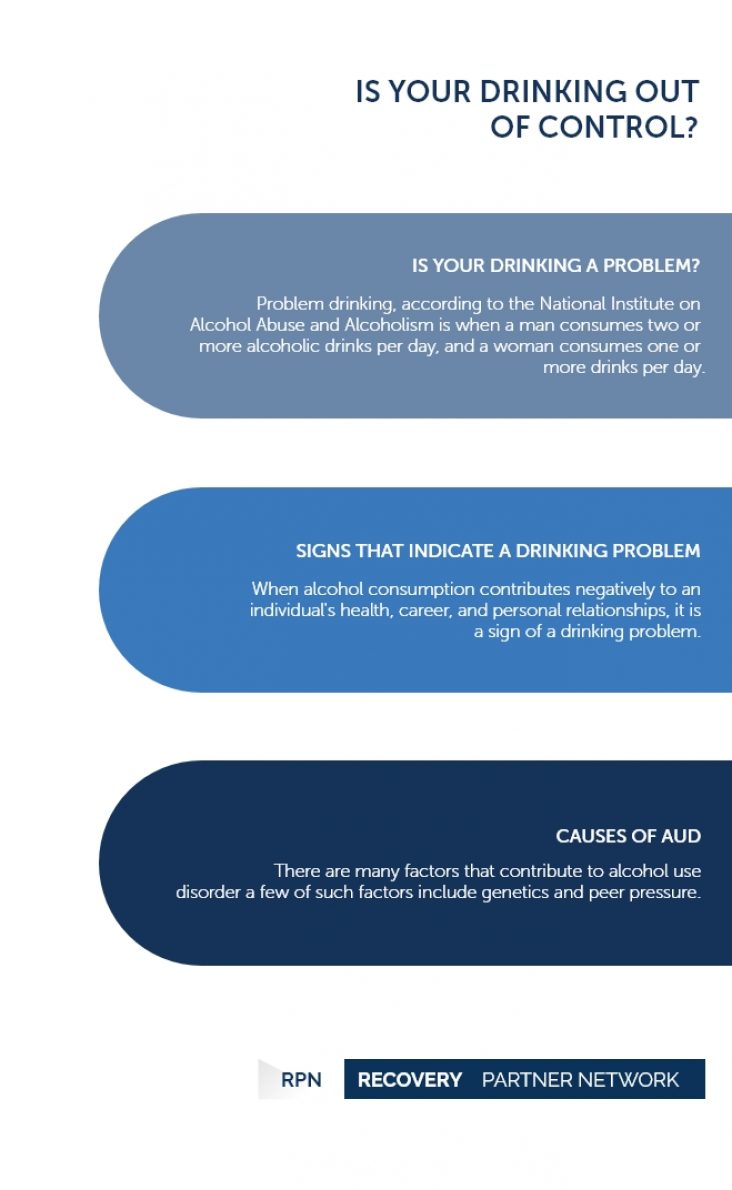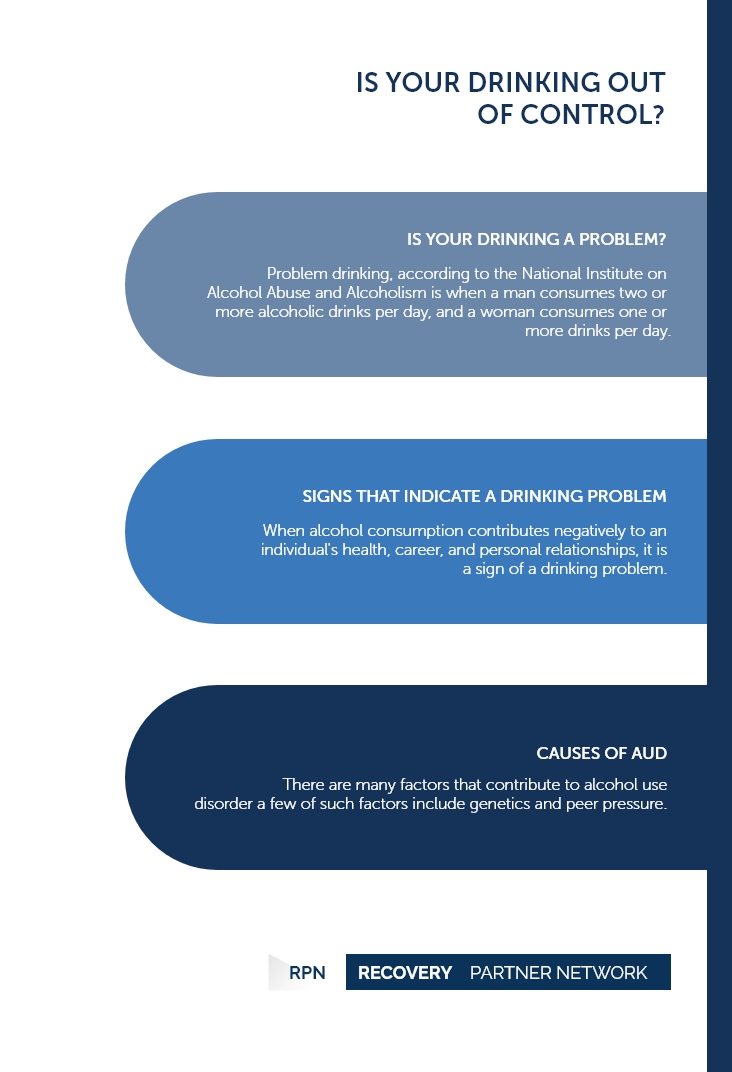If your drinking is out of control, the possibility of developing an AUD is significantly high.
Is Your Drinking Out of Control?
Out of Control Drinking | Table of Contents
Is Your Drinking a Problem?
Social drinking and problem drinking are not the same. Social drinking is when an individual regularly consumes alcohol in social settings but without causing any significant health or interpersonal issues. Problem drinking, according to the National Institute on Alcohol Abuse and Alcoholism (NIAAA) website “Rethinking Drinking,” is when:
- A man consumes two or more alcoholic drinks per day.
- A woman consumes one or more drinks per day.
Research indicates that about one in every four individuals who exceed these limits may have AUD, while others are gradually heading towards the development of AUD.
A 2016 survey by the National Survey on Drug Use and Health (NSDUH) shows that about 50 percent of Americans drank an alcoholic beverage in the past month. However, all the individuals who fell into this 50 percent did not develop an AUD: only 6 percent of the population in that year had severe AUD. Thus, there is no such thing as an “established risk” for all: the risks may vary greatly from one person to another. An individual can develop AUD even at lower levels of alcohol consumption.
FAQ
- Why do I get out of control when I drink?
- Does alcohol kill brain cells?
- Does drinking water offset alcohol?
Alcohol makes it harder for the prefrontal cortex to function as it normally does, as it disrupts decision-making and rational thought. This causes an individual to act without thinking and lose control.
While drinking can certainly make you act and feel as though you’ve lost a brain cell or two, there’s no evidence to prove this theory. However, that does not necessarily suggest alcohol has no effect on your brain.
Drinking a few glasses of water before, during, and after alcohol consumption can help counteract the dehydration effect of alcohol. Although water does not speed up the alcohol process or sober you up faster, it does tackle the issue of dehydration after a heavy session.
Signs that Indicate a Drinking Problem
As alcohol consumption is prevalent across many cultures, it has become quite difficult to recognize someone struggling with alcohol addiction or abuse. Certain individuals drink occasionally and never develop an issue, whereas some develop habits and addictions to alcohol that can have a negative impact on their health, careers, and personal relationships.
Some of the signs that indicate a drinking problem, as suggested by the National Council on Alcoholism and Drug Dependence (NCADD), are:
- You want to quit drinking but find it difficult to do so
- You have developed a tolerance to alcohol
- You find yourself in dangerous or risky situations
- You have a different personality when drunk
- You have frequent memory lapses or blackouts
- You undergo withdrawal symptoms when you quit drinking
- You no longer partake in activities that were of interest before
- You experience interpersonal issues
Since you consistently engage in regrettable behaviors while intoxicated, you wish to cut down or quit drinking altogether, but you find it difficult and keep drinking.
You drink significantly more than what you did initially, and you also need more alcohol to feel drunk now. You also tend to drink faster with the sole intention of getting drunk rather than to enjoy the social experience.
Excessive drinking has placed you in situations that are extremely dangerous to you or someone around you. For example, driving under the influence, getting into fights, and having unprotected sex.
Your sober personality and drunk personality are completely different from each other. This hints at not just a drinking issue but also an underlying emotional or psychological issue that urges you to seek refuge in drinking.
Frequent memory lapses or blackouts are one of the adverse consequences of problem drinking. Blacking out does not always imply passing out: problem drinkers can be conscious for a considerable period of time, but they usually have no recollection of what happened.
Our body has formed a strong dependence on alcohol, so much so that you can no longer function normally without it. You may undergo painful and potentially deadly withdrawal symptoms upon discontinuing alcohol consumption, including anxiety, agitation, headaches, shaking, nausea, seizures, tremors, and vomiting.
You spend most of your time consuming and recovering from alcohol, making it difficult for you to partake in social activities or hobbies that were previously enjoyed.
You may start having issues with your friends, family, co-workers, and others due to your problem drinking
FAQ
Alcohol dulls the brain signal that warns them of their mistake. While individuals are aware of their error, alcohol causes them to care less about it.
According to the journal Cognitive, Affective & Behavioral Neuroscience, MRI scans of drunk and sober individuals indicate alcohol-related changes in the prefrontal cortex, the region of the brain thought to be responsible for moderating social behavior and aggression.
Causes of AUD
An individual who regularly consumes alcohol may not necessarily have an AUD. However, reports indicate that about 90 percent of individuals who misuse alcohol are unaware that they have a drinking problem and require urgent treatment. Severe AUD comes along with potentially life-threatening side effects that can affect not just the user but those around them as well.
There are many factors that contribute to an unhealthy relationship with alcohol. For example, genetics, peer pressure, personal struggles, and a history of abuse.
Consuming alcohol at younger ages can also make an individual more prone to alcohol abuse or addiction. The NIAAA shows that genetic factors play a massive role in children abusing alcohol. Children who consume alcohol are at a higher risk of developing AUD in adulthood. Some of the other factors that lead to alcohol abuse in children and teenagers are:
- Parents with depression or other mental health issues
- Parents with AUD or SUD
- Regular family conflicts
What to Do if Your Drinking is Out of Control?
Although those around you may see the signs of troubling drinking habits, you will require the services of mental and medical professionals to diagnose your condition properly. Generally, a physician starts the diagnosis most of the time by performing an initial test. He/she may also refer you to a reliable treatment specialist.
There are many treatment specialists available throughout the US for treating AUD and related complications. Ensure that you choose a licensed healthcare provider for long-term treatments and inquire about the treatment options for your specific condition. Since talk therapy, counseling, and medications are a few of the crucial components of AUD treatment, make sure they are covered by your treatment program.
Consulting the following experts can also be beneficial:
- Licensed clinical social worker:
- These experts help promote well-being through diagnosis and treatment while also treating any underlying mental illnesses.
- Addiction medicine specialist:
- These experts are doctors who are specialized in addiction medicine. The American Board of Addiction Medicine (ABAM) certifies and equips these doctors to prevent, screen, intervene, and treat AUD and SUD patients.
- Psychotherapist:
- These experts help identify the underlying cause that led you to alcohol abuse in the first place. They also help patients in coping with triggers and general life challenges.
- Psychiatrist:
- These medical experts are specialized in the diagnosis, treatment, and prevention of AUDs and SUDs.
FAQ
Be aware of the amount of alcohol you consume and practice self-control. You can also control your drinking by removing all alcohol from your home and designating abstinence day.
Recovery Partner Network
We aim to educate and empower. If you feel our library of resources does not cover your specific need, reach out to us, and we would be happy to help.
STATISTICS
© Copyright 2026


